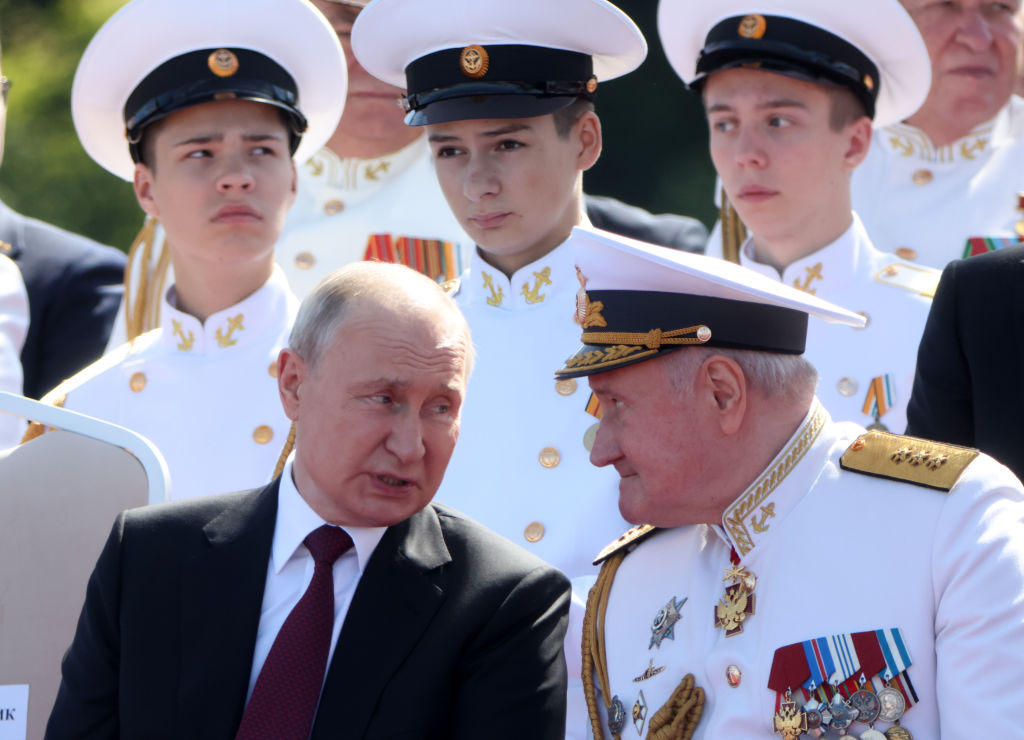Happy Monday! Wisconsin decided last week to make history and designate their mixology mistake, the brandy old fashioned, as the (somewhat) official state cocktail—the first such designation in the country. The editors of this newsletter won’t stand for such offense to good American whiskey. Steve Hayes, what do you have to say for yourself?
Quick Hits: Today’s Top Stories
- The Israel Defense Forces (IDF) engaged in intense combat with Hamas over the weekend as Israeli troops closed in on Gaza City’s Al-Shifa Hospital, under which Israeli military officials say Hamas’ main command and control center lies. The Hamas-run Gaza Health Ministry claimed the IDF had blockaded and fired on the hospital; the IDF acknowledged fierce fighting in the area surrounding the facility, but denied attacking or blockading the hospital itself. Israeli officials said they’ve established a safe corridor to evacuate the facility, but doctors at the hospital reported some people being shot at while attempting to flee. Electricity and fuel are running low at the facility, and some patients requiring intensive care have reportedly died after a power outage. “The United States does not want to see firefights in hospitals where innocent people, patients receiving medical care, are caught in the crossfire,” White House National Security Adviser Jake Sullivan said on Sunday. “We’ve had active consultations with the Israeli Defense Forces on this.”
- French President Emmanuel Macron on Friday offered his strongest criticisms yet of Israel’s war in Gaza, calling for a ceasefire. “These babies, these ladies, these old people are bombed and killed,” he said. “There is no reason for that and no legitimacy, so we do urge Israel to stop.” Macron apparently softened his comments on Sunday in a call with Israeli President Isaac Herzog. According to Herzog’s office, the French president said he didn’t mean to suggest Israel was intentionally harming civilians and that he supported Israel’s war against Hamas. The Palestinian death toll from the war, according to the Gaza Health Ministry, has risen to more than 11,000—though that figure, even if accurate, doesn’t distinguish between combatants and civilians. That said, U.S. officials’ confidence in the rough accuracy of the reported deaths has grown in recent days. “We think they are very high, frankly, and it could be that they are even higher than are being cited,” Barbara Leaf, assistant secretary of state for Near Eastern Affairs, said last week in testimony before the House Foreign Affairs Committee. Secretary of State Antony Blinken said Friday that “far too many Palestinians have been killed, far too many have suffered these past weeks.”
- The paramilitary Rapid Support Forces (RSV), under the command of Gen. Mohamed Hamdan “Hemedti” Dagalo, overran a Sudan Armed Forces military base in El Geneina on November 4, reportedly killing more than 800 people in a refugee camp near the Darfur capital. According to the United Nations refugee agency and reports from eyewitnesses and local activists, the RSV went door to door in the Ardamata refugee camp, systematically killing men and boys. Some locals estimated the total death toll resulting from the early November attacks could be more than 1,000.
- Russia launched missile strikes on Kyiv over the weekend, according to Ukrainian military officials, resuming the bombardment of the Ukrainian capital after a nearly two-month-long hiatus. No major damage or casualties were reported. Russian forces also renewed attacks on Ukrainian positions near and around Bakhmut and Avdiivka, both cities in eastern Ukraine—though Ukrainian officials said on Sunday the “attacks are being repelled.” Ukrainian defense leaders, meanwhile, said they struck two Russian landing ships with sea drones in an overnight operation in Crimea on Thursday.
- The Pentagon announced Sunday U.S. military forces had carried out another round of airstrikes on Iranian facilities in eastern Syria—the third such bombardment in recent weeks—in response to dozens of attacks targeting U.S. troops over the last month. The strikes, according to Defense Secretary Lloyd Austin, were conducted “on a training facility and safe house near the cities of Abu Kamal and Mayadin,” and reportedly killed six or seven Iranian proxy fighters.
- Five U.S. troops were killed on Friday when a military helicopter crashed into the Mediterranean Sea after a training incident, which defense officials said occurred “during a routine air refueling mission as part of military training” and exhibited no indications of foul play from hostile actors. “While we continue to gather more information about this deadly crash, it is another stark reminder that the brave men and women who defend our great nation put their lives on the line each and every day to keep our country safe,” Austin said in a statement Sunday.
- President Joe Biden and Chinese President Xi Jinping will meet this week at the Asia-Pacific Economic Cooperation summit, the White House confirmed on Friday. The meeting is the first between the two leaders since last November’s G20 summit in Bali, and comes after a diplomatic chill in the wake of the spy balloon incident earlier this year. A top priority for the Biden administration will be resuming military-to-military talks between Chinese and American forces; China cut off communication in August 2022 following then-Speaker Nancy Pelosi’s visit to Taiwan. In recent months, the Chinese military has conducted dangerous intercepts of U.S. aircraft operating in the region, leading to several close calls.
- House Speaker Mike Johnson on Saturday unveiled a “laddered” short-term continuing resolution (CR) to stave off a government shutdown that would fund the departments of Housing and Urban Development, Veterans Affairs, Energy, Agriculture, and Transportation until January 19, and the rest of the government until February 2. Both proposals would fund the government at current spending levels. “The bill will stop the absurd holiday-season omnibus tradition of massive, loaded-up spending bills introduced right before the Christmas recess,” Johnson said in a statement on Saturday. The measure does not include the broad cuts that some House conservatives had pushed for, and several hardliners quickly announced they’d vote against the CR. Johnson said he intends to bring the bill to the floor for a vote on Tuesday.
- Sen. Tim Scott of South Carolina suspended his presidential campaign last night in a surprise move that reportedly caught even his own campaign staff off guard. “I think the voters, who are the most remarkable people on the planet, have been really clear that they’re telling me, ‘Not now, Tim,’” Scott said in a Fox News interview Sunday night. Scott said that he wouldn’t make an endorsement in the race: “The best way for me to be helpful is to not weigh in.” He also said that he wasn’t interested in serving as a running mate to any of the candidates.
- Suspicious envelopes—some containing fentanyl—were sent to election offices in Georgia, Nevada, California, Oregon, and Washington last week, and in Washington state resulted in the closing and evacuation of election offices in multiple counties, delaying ballot counting in last week’s municipal elections. “This is domestic terrorism,” said Georgia Secretary of State Brad Raffensperger. “It needs to be condemned by anyone that holds elected office and anyone that wants to hold elective office anywhere in America.” Authorities are still investigating the source of the letters.
- A federal court on Friday ordered the Louisiana legislature to redraw its congressional map after finding the current map—which includes only one majority-black district—likely violated the Voting Rights Act by diluting the power of black voters in the state. The Fifth Circuit Court of Appeals’ order requires the legislature to create a new map by January 15, or a lower court will take control of the process.
- Don Samuels, a former Minneapolis City Council member, announced on Sunday that he will challenge Rep. Ilhan Omar in next year’s Democratic primary. Samuels, who narrowly lost his first bid to unseat Omar in 2022 by only 2 points, said he will make Omar’s positions on Israel and its war against Hamas a major focus of his campaign.
Two Treaties for the Trash

While the mortal status of Russian President Vladimir Putin has once again come into question, there can be no denial of the death of two armaments treaties in recent weeks, as Russia officially withdrew its ratification of the Comprehensive Nuclear Test Ban Treaty (CTBT) and ended its participation in the Treaty on Conventional Armed Forces in Europe (CFE).
Russia’s decision to formally withdraw from these two Cold War-era defense treaties is just the latest in a long record of rejecting Western norms, and is meant to send a message both internally and externally. Locked in an ongoing offensive against Ukraine, Moscow seeks to project strength abroad, while Putin, up for “reelection” next year, must project strength at home. More than anything, the long-foreseen end to formal agreements and limits on Russia’s offensive capabilities represent a further degradation of the Western-Russian relationship—a relationship that might not recover in our lifetime.
NATO members and allies were quick to condemn Russia’s decision, decrying the withdrawals—and the ongoing attack on Ukraine—as a ...
As a non-paying reader, you are receiving a truncated version of The Morning Dispatch. Our full 1,208-word story on Russia’s abandonment of various international treaties is available in the members-only version of TMD.
Worth Your Time
- Writing for the New York Times, Charlie Savage, Maggie Haberman, and Jonathan Swan provide an in-depth look at what a second Trump administration’s immigration policy would look like, based on interviews with several Trump advisers—including Stephen Miller. “The constellation of Mr. Trump’s 2025 plans amounts to an assault on immigration on a scale unseen in modern American history,” they wrote. “To help speed mass deportations, Mr. Trump is preparing an enormous expansion of a form of removal that does not require due process hearings. To help Immigration and Customs Enforcement carry out sweeping raids, he plans to reassign other federal agents and deputize local police officers and National Guard soldiers voluntarily contributed by Republican-run states. To ease the strain on ICE detention facilities, Mr. Trump wants to build huge camps to detain people while their cases are processed and they await deportation flights. And to get around any refusal by Congress to appropriate the necessary funds, Mr. Trump would redirect money in the military budget, as he did in his first term to spend more on a border wall than Congress had authorized.” According to Trump’s advisers, existing statutory authority and executive power would be used to implement the policies. “All of the steps Trump advisers are preparing, Mr. Miller contended in a wide-ranging interview, rely on existing statutes; while the Trump team would likely seek a revamp of immigration laws, the plan was crafted to need no new substantive legislation,” they wrote. “And while acknowledging that lawsuits would arise to challenge nearly every one of them, [Miller] portrayed the Trump team’s daunting array of tactics as a ‘blitz’ designed to overwhelm immigrant-rights lawyers. ‘Any activists who doubt President Trump’s resolve in the slightest are making a drastic error: Trump will unleash the vast arsenal of federal powers to implement the most spectacular migration crackdown,’ Mr. Miller said, adding, ‘The immigration legal activists won’t know what’s happening.’”
Presented Without Comment
Bloomberg: Portugal’s Outgoing Premier Apologizes for Cash in Aide’s Office
Also Presented Without Comment
Wall Street Journal: FBI Seized New York City Mayor Eric Adams’ Electronic Devices in Probe
Also Also Presented Without Comment
Axios: January 6 Rioter Dubbed “QAnon Shaman” Plans to Run for U.S. Congress
Toeing the Company Line
- In the newsletters: The Dispatch Politics crew reported on the state of Tim Scott’s presidential campaign, Haley detailed (🔒) the limited leeway Speaker Mike Johnson has to navigate the impending government shutdown, Nick sketched out (🔒) a strategy for Democrats to put party over president in 2024, Jonah unpacked the social and political problems that stem from missing what you never had, and Chris broke down (🔒) the results of last week’s off-year election.
- On the podcasts: Jonah ruminates on the latest GOP presidential debate and the Israel-Hamas war on The Remnant, while Jamie Weinstein speaks with Ben Judah of the Atlantic Council about the future of Saudi Arabia and its royal family on The Dispatch Podcast.
- On the site over the weekend: Dan Vallone outlined the importance of having conversations with veterans about their service, Marvin Olasky argued that Christian nationalists are wrong to turn to Old Testament Israel as an example for America to follow, and Roosevelt Montás reflected on the lessons of Jorge Luis Borges’ 1940 short story Tlön, Uqbar, Orbis Tertius.
- On the site today: Luis has the details on a new organization fighting for academic freedom, and Arthur Herman previews the upcoming meeting between Biden and Xi.
Let Us Know
With the United States commemorating Veterans Day over the weekend, we’d like to extend our heartfelt gratitude to everyone in the Dispatch community who has served our country. Which veterans in your life were you thinking of on Saturday?








Please note that we at The Dispatch hold ourselves, our work, and our commenters to a higher standard than other places on the internet. We welcome comments that foster genuine debate or discussion—including comments critical of us or our work—but responses that include ad hominem attacks on fellow Dispatch members or are intended to stoke fear and anger may be moderated.
With your membership, you only have the ability to comment on The Morning Dispatch articles. Consider upgrading to join the conversation everywhere.